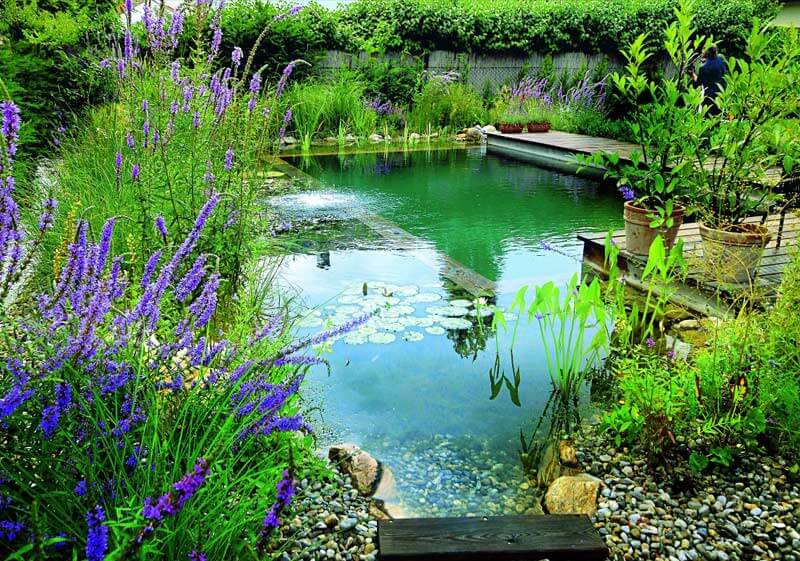A Holistic answer to the traditional Swimming Pool
Enjoying a refreshing swim in cool water is the remedy for the scorching days of summer. Oceans, lakes and rivers are desired destinations often with time and traffic involved. Imagine being able to enjoy a refreshing natural swimming retreat in your own back yard.
Natural swimming pools are popular in Europe and are gaining in popularity in the U.S. They are chemical free and perfect option for those that are chemically sensitive, and eco friendly. The natural pool can look like a wonderful natural oasis, designed to emulate ponds with natural shapes, rocks, waterfalls, and plants.
Natural pools are not like chlorine or saltwater pools that use strong chemicals and mechanical filter systems. Natural pools work similarly to a lake or a pond. They function by having two sources of water, the pool and a regeneration/water purification zone, build with plants or a gravel filter. As water flows between the two zones, the water is repeatedly being recycled and cleaned. The plants are kept separate from the swimming area to protect the plants from damage.
Natural pools rely on the organic properties of plants to keep the water healthy and clean. Natural pools host three types of plants: floating plants, biological filters, and oxygenating plants.
Here are a few common plants used in natural pools:
Water lilies – lily pads are the most commonly seen water plants. They survive well in temperate climates and are great filtration tools.
Duckweed – this tiny flowering plant will help reduce algae.
Plankton – the vital plankton bring life and chi to the water.
An interesting component is that the natural pool is not covered in the winter. They can be used in any climate and they freeze in a cold winter. This is a natural process and does not damage the eco-system. When the warm weather comes, the pool comes back in the natural cycle.
Advantages of a Natural Pool
Sustainability – they don’t add to air, earth and water pollution. We help with the reduction of global warming, acid rain, and the depletion of the ozone layer.
Lower Maintenance and Upkeep – as they are “self-cleaning”, they require less maintenance.
Design and Beauty – creativity is the key, and these pools can be designed for any size space.
Disadvantages of the Natural Pool
Cost – natural pools can be much more expensive to install. It requires two bodies of water and a very skilled installer.
Legal – some local laws or HOA laws may not allow natural pools as the water is not that “sparkling” blue. The clarity is different and the color is more natural looking.
Size – ideally you want to have a nice large area to place your natural swimming pool – to allow for the pool and the water purification pool.
Overall, if you would like to have a natural experience of swimming in a mountain stream or cool lake, and be free of chemicals, you may want to consider installing a natural swimming pool. They offer beautiful aesthetics to the property and an oasis experience.
By Renae Jensen

